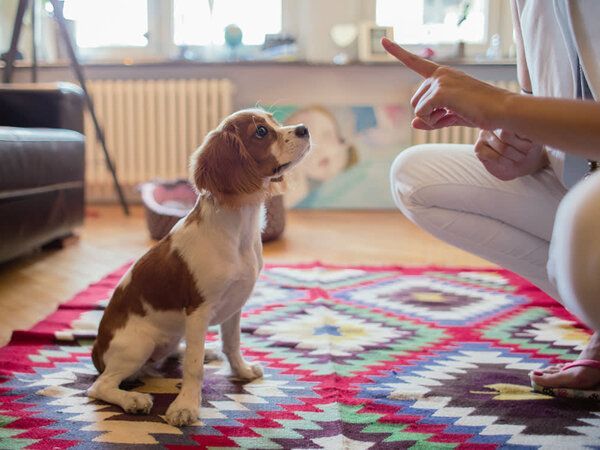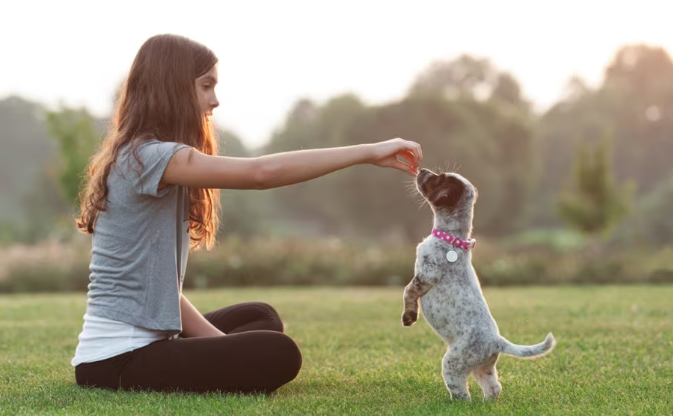Early Training for Puppies:
A Complete Guide on How to Start
Comprehensive First Steps From a Puppy Trainer
Bringing home a puppy is the beginning of the best adventure, but the first few months are crucial in developing your new pet's behavior and habits. Early training can set you up for success with a well-adjusted, obedient, and happy companion: here’s a guide of the most important things to focus on.
One of the most important things is to start early- begin training your puppy as soon as you bring them home. Puppies have a critical socialization window between 3 to 14 weeks old, during which they are most receptive to learning experiences. Introduce them to various people, animals, environments, sights, and sounds to build their confidence and prevent future anxieties. Use positive reinforcement techniques to encourage good behavior- reward your puppy with treats, praise, or playtime whenever they exhibit the desired behavior. This method cultivates a stronger bond between you and your pet while making learning a happy experience
Teaching basic commands like “sit,” “stay,” “come,” and “down” are the cornerstone of puppy training. Keep training sessions short (5-10 minutes) and frequent throughout the day to maintain your puppy's focus and prevent boredom. Consistency in training for puppies is key; use the same verbal cues and hand signals every time you command them. Consistency will help them understand, remember, and respond to your instructions every time rather than intermittently, or only in familiar circumstances.
Speak With A Dog
Training Expert
Speak With A Dog Training Expert
Thank you for contacting us!
We will contact you shortly!
Please try again later.
Comprehensive First Steps From a Puppy Trainer
Bringing home a puppy is the beginning of the best adventure, but the first few months are crucial in developing your new pet's behavior and habits. Early training can set you up for success with a well-adjusted, obedient, and happy companion: here’s a guide of the most important things to focus on.
One of the most important things is to start early- begin training your puppy as soon as you bring them home. Puppies have a critical socialization window between 3 to 14 weeks old, during which they are most receptive to learning experiences. Introduce them to various people, animals, environments, sights, and sounds to build their confidence and prevent future anxieties. Use positive reinforcement techniques to encourage
Speak With A Dog
Training Expert
Speak With A Dog Training Expert
Thank you for contacting us!
We will contact you shortly!
Please try again later.
good behavior- reward your puppy with treats, praise, or playtime whenever they exhibit the desired behavior. This method cultivates a stronger bond between you and your pet while making learning a happy experience
Teaching basic commands like “sit,” “stay,” “come,” and “down” are the cornerstone of puppy training. Keep training sessions short (5-10 minutes) and frequent throughout the day to maintain your puppy's focus and prevent boredom. Consistency in training for puppies is key; use the same verbal cues and hand signals every time you command them. Consistency will help them understand, remember, and respond to your instructions every time rather than intermittently, or only in familiar circumstances.
Easy to Follow Training for Puppies
Introduce crate training early on because a crate provides a safe space for them and aids in early dog potty training. Ensure the crate is comfortable and never used as a form of punishment. Gradually increase the duration your puppy spends in the crate to help them acclimate to it. Establish a routine for potty breaks to instill good bathroom habits. Take your puppy outside after meals, playtime, and naps. Reward them when they eliminate in the designated spot to positively reinforce the behavior.
Expose your puppy to various experiences as soon as possible to foster proper social skills. Controlled interactions with other vaccinated dogs in safe environments can prevent fear or aggression issues in the future. Additionally, get your puppy accustomed to being handled and groomed as soon as possible. Regularly brush their coat, trim their nails, clean their ears, and brush their teeth to make these activities stress-free. This not only keeps them healthy but also helps in establishing
Easy to Follow Training for Puppies
Introduce crate training early on because a crate provides a safe space for them and aids in early dog potty training. Ensure the crate is comfortable and never used as a form of punishment. Gradually increase the duration your puppy spends in the crate to help them acclimate to it. Establish a routine for potty breaks to instill good bathroom habits. Take your puppy outside after meals, playtime, and naps. Reward them when they eliminate in the designated spot to positively reinforce the behavior.
Expose your puppy to various experiences as soon as possible to foster proper social skills. Controlled interactions with other vaccinated dogs in safe environments can prevent fear or aggression issues in the future. Additionally, get your puppy accustomed to being handled and groomed as soon as possible. Regularly brush their coat, trim their nails, clean their ears, and brush their teeth to make these activities stress-free. This not only keeps them healthy but also helps in establishing trust between you and your puppy, and/or between them and a consistent dog groomer.
Redirect or discourage unwanted behaviors like chewing on furniture or excessive barking by using redirection techniques or interrupting the behavior with a sharp- but unaggressive- “no.” Always follow with positive reinforcement when your puppy complies with your request. Remember, training takes time and patience- every puppy learns at their own pace, so be patient and consistent in your approach. Celebrate small victories and avoid getting frustrated with setbacks.
The start of training may feel overwhelming, but we hope this guide has broken down what may seem a daunting task into more manageable parts that can help you plan the best training approach for you and your puppy that covers all the bases. If you need help or guidance with any of these training factors from a professional puppy trainer, Elite-K9 is just a call away!
trust between you and your puppy, and/or between them and a consistent dog groomer.
Redirect or discourage unwanted behaviors like chewing on furniture or excessive barking by using redirection techniques or interrupting the behavior with a sharp- but unaggressive- “no.” Always follow with positive reinforcement when your puppy complies with your request. Remember, training takes time and patience- every puppy learns at their own pace, so be patient and consistent in your approach. Celebrate small victories and avoid getting frustrated with setbacks.
The start of training may feel overwhelming, but we hope this guide has broken down what may seem a daunting task into more manageable parts that can help you plan the best training approach for you and your puppy that covers all the bases. If you need help or guidance with any of these training factors from a professional puppy trainer, Elite-K9 is just a call away!



